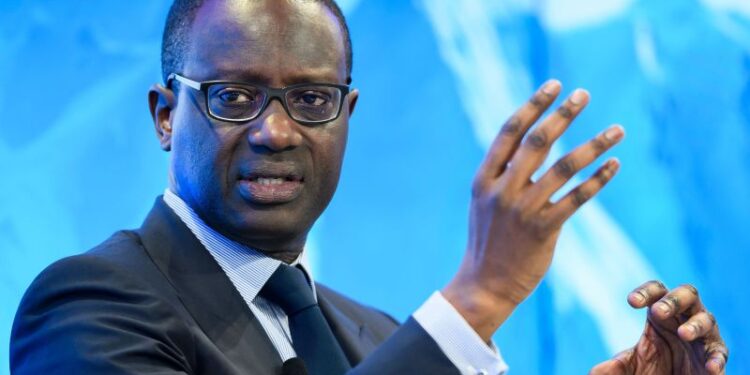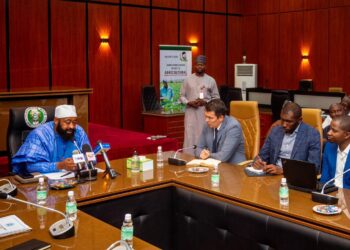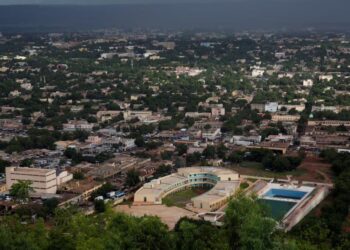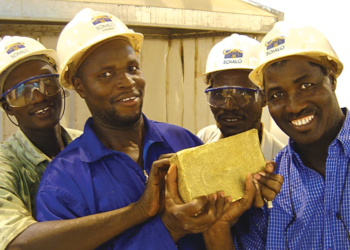Tidjane Thiam is an Ivorian businessman and politician, having combined an illustrious career at the highest levels of global finance with renewed engagement in Côte d’Ivoire’s political landscape.
Born in Abidjan, Côte d’Ivoire, in 1962, Tidjane Thiam belongs to a family with significant political and historical influence in the country. On his mother’s side, he is descended from Queen Yamousso, after whom Côte d’Ivoire’s capital, Yamoussoukro, is named. Thiam’s mother, Marietou, was the niece of Félix Houphouët-Boigny, the founder and first president of Côte d’Ivoire. His uncle was Habib Thiam, who served as Prime Minister of Senegal. These family connections placed Thiam from the outset within the Francophone African political elite.
Thiam completed his studies in France, graduating from the École Nationale Supérieure des Mines de Paris. He later earned an MBA from the prestigious INSEAD business school. This combination of strong political affiliation and a Western academic education has formed the foundation for his professional career, providing him with a strong international network and a deep understanding of global economic dynamics.
Thiam began his career at McKinsey & Company, a management consultancy. However, he returned to Côte d’Ivoire in the mid-1990s to enter public service. In 1994, Thiam was appointed Director of the National Office for Technical and Development Assistance (BNETD), the body responsible for the country’s infrastructure and major projects.
In 1998, he rose to become Minister of Planning and Development under President Henri Konan Bédié. During this period, Thiam played a role in implementing economic policies aimed at developing infrastructure and attracting investment. But this domestic political career quickly ended with a military coup in December 1999, which ousted the president with his own hands. Thiam left Côte d’Ivoire following the coup, ending his first chapter in African politics and beginning a new one in international finance.
After leaving Ivory Coast, Thiam embarked on a career that demonstrated his competence in leading major international financial institutions.
In 2002, Thiam joined the British insurance group Prudential. After successive promotions, he was appointed Group Chief Executive Officer in 2009, becoming the first African CEO of a company listed on London’s FTSE 100 index. During his tenure at Prudential, Thiam is credited with shifting the group’s focus toward Asian markets, contributing to a doubling of operating profits and a significant increase in dividends from the region within six years. However, his tenure faced challenges, most notably a failed $35 billion acquisition attempt of AIA (AIG’s Asian subsidiary), which was canceled due to insufficient investor support.
In 2015, Thiam rose to the top of European banking with his appointment as CEO of Swiss bank Credit Suisse. He assumed leadership during a critical period that required a radical restructuring of the bank following the global financial crisis. Thiam implemented a strategy focused on reducing the bank’s high-risk investment activities and redirecting resources toward wealth management, particularly in Asian and emerging markets.
This strategy led to cost reductions and a strengthening of the bank’s capital and liquidity base. However, his tenure was not without controversy, particularly with the spying scandal that revealed the surveillance of former employees. Thiam denied prior knowledge of the surveillance operations but resigned from his position in February 2020, ending a successful yet turbulent career at one of the world’s leading banks.
After serving on the boards of global companies and participating in international committees (such as the G20 High-Level Independent Panel on Global Public Goods Financing for Pandemic Preparedness and Response), Thiam returned to Côte d’Ivoire in 2023.
His return marked a radical shift, as he was elected president of the Democratic Party of Côte d’Ivoire (PDCI), the party founded by his grandfather, Félix Houphouët-Boigny. This assumption of leadership of the country’s largest opposition party placed him squarely at the center of political conflict, and he was declared a leading candidate for the 2025 presidential election.
Thiam faced the challenge of national identity as soon as he announced his candidacy. The Ivorian Constitution stipulates that presidential candidates must hold only Ivorian citizenship. Since Thiam held French citizenship, he was forced to formally renounce it to meet the legal requirements.
In addition, Thiam faces the challenge of building a strong, local support base after years of absence and alienation from the Ivorian street. He is viewed by some as a “man of the West” who lacks a daily connection to the concerns of ordinary citizens, despite his economic expertise. His return has also opened the door to internal disputes within the Democratic Party itself.
Recently, his candidacy has encountered legal and political obstacles that have sparked controversy over the integrity and transparency of the electoral process. His supporters view his legal targeting as an “act of subversion of democracy” aimed at eliminating him, while his opponents insist on strictly enforcing legal eligibility requirements.
Quotes Tidjane Thiam
“Do not be afraid to take risks. It’s the only way to make progress.”
“I believe in productivity improvements. An organization should improve productivity by 2 or 3 percent every year. And I always prefer to talk about productivity more than cost. It’s a much better word, because that’s what’s relevant.”
“When we don’t have to cut them anymore. My real philosophy about cost is productivity gain.”
“I build a very positive picture of the world economy. Yes, you have all the issues around Syria and Korea and populism in Europe and all that, but if you take a long-term perspective, I am still very positive—but you still have to have a good defense.”
“I am a great believer in the emerging markets story.”
“When you’ve faced a military coup, bankers are not scary.”



























































